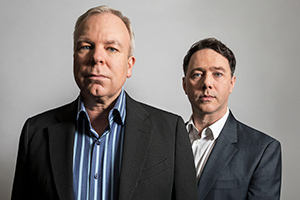Steve Pemberton and Reece Shearsmith interview
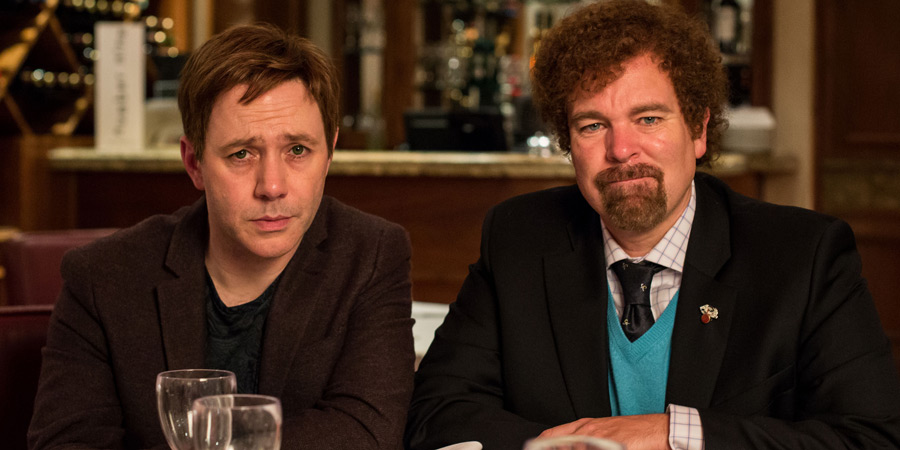
Inside No. 9 - the brilliant show from the minds of Reece Shearsmith and Steve Pemberton - is back. Following on from the festive-themed episode in December, Series 3 now continues with five more diverse tales. It looks set to be the strongest series yet, with some brilliant episodes set to be screened.
To add to the excitement, as we're writing this, camera are being readied to film six more episodes, with the resultant fourth series set to be shown either later this year, or in 2018. Some clues on what's coming up in Series 4 later in this article, but first let's find out from the men themselves what treats are in store in Series 3...
Reece says: "There are five more rooms to explore, with comedy, great horror and psychological thrills. A mixture of the things that you would expect us to do, but in new and surprising ways, with a great new cast and with Steve and I as the driving force behind those stories. It's a mixed bag as anthology shows should be: we go into a lot of different worlds, high gothic, silly, Agatha Christie, mystery and some of it more psychologically disturbing."
First up is The Bill, which has the simple premise that people on a night out are arguing over a restaurant bill... the twist being that they want to be the one to pay for it. This being Inside No. 9, it's not the only twist in the episode though!
The Riddle Of The Sphinx may initially sound a dull premise. A university professor sets out to teach a young lady how to tackle a cryptic crossword. It's definitely anything but a boring episode though. Without wishing to spoil anything, we'll just say that this one has perhaps the best ending of any IN9 to date.
After that there's Empty Orchestra, an episode that is set in a karaoke booth; Diddle Diddle Dumpling, which is about a man's obsession with finding the owner of a lost shoe; and, last but not least, the art gallery based Private View.
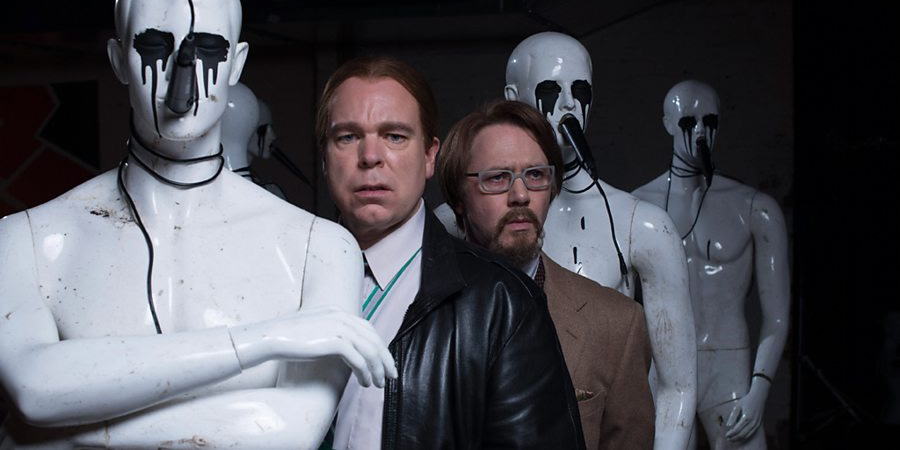
So how do Pemberton & Shearsmith think up the stories? It turns out sometimes the ideas come from real life. Steve explains they were in a restaurant together when the inspiration for the next episode hit them: "We saw these people arguing about the bill... but they were arguing about wanting to pay it, and we just came out thinking 'could that be a number 9?' The exercise then is 'can you sustain that one idea?'...
"Similarly, with the crossword one, I'm a big fan of cryptic crosswords, and I just started thinking - having read this excellent book by Alan Connor - whether you could dramatise doing a crossword, something that is so un-dramatic. Of course, we added a few other elements to it..."
Reece comments: "If we get an idea that tickles us and we think has got legs, surprising twists and turns can come from it. That's a starting point and then we will pursue it and we'll beat out a story. They're black comedies and we like telling a story that once you start watching you've got to see through to the end. You might not like where it is going but you can't take your eyes off it. Hopefully it's an enjoyable bit of television."
Steve continues: "When you're in the writing phase, you can see anything in day-to-day life that could spark your imagination. There was one morning where I saw a shoe abandoned by the side of the road and wondered who'd left it there and what would happen if someone was obsessed with getting it back to its rightful owner. Again, we went back and started writing that as an episode. If we weren't in writing mode and we saw those things we probably wouldn't have paid any attention to them. So it's a mixture of things that you see and observe and then it's just what interests you."
The duo admit the broad brief of the show does make things harder for them in some ways. "We have sort of created a platform where you can do anything - parameters sometimes help you." They first developed the idea of Inside No. 9 when performing in plays in the West End. It was the 'claustrophobia' of such an environment and the tension that invokes that inspired them to consider trying to bring some of that to the screen. Speaking about the episodes they write, they point out: "They're often set in real time and barely ever leave the room or house we set them in, and that's its own problem and challenge in a way, to keep the narrative moving on when you can't leave it. A passage of time can help you do that."
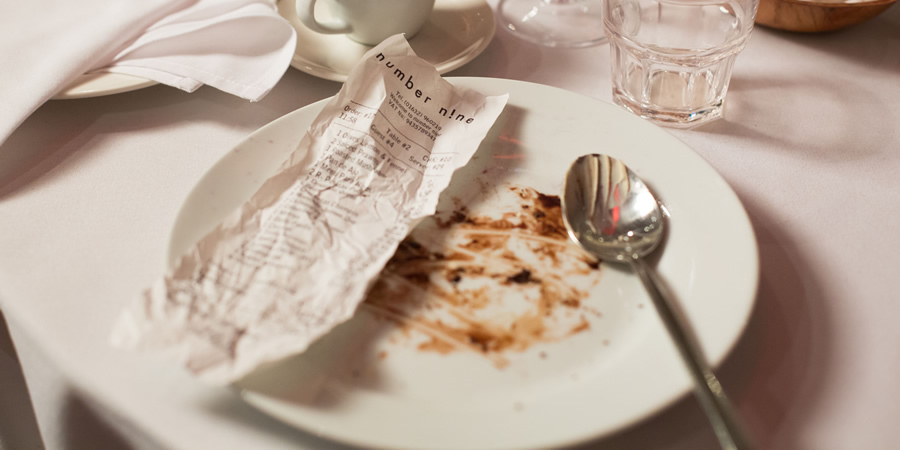
It turns out that the 'number 9' link in each script is somewhat of an afterthought. "We've managed to hitch a number nine on to most of them. Sometimes it's the last thing we think about; we think of the idea first, not what can it be... it could really be anything. We have started to toy with ideas such as 'you could do a body with a tag on the toe with the number 9 on it'" Adam Tandy, the show's producer, points out: "It's such a loose concept we have actually changed the 9!"
Despite all the episodes looking different and featuring different characters, there is more than a '9' on a door that links them. Pemberton & Shearsmith's trademark dark writing style is woven into every episode. On this topic they say: "Yeah, it's funny, we tried as an experiment to write something that was completely 'BBC One'... it was fine, the notion of writing just a funny thing, but then it just felt like it was lacking something...
"Not that it is easy to write a script for BBC One, but it was just 'surface comedy' without something turning on its head... not always a twist, but something a little deeper. We're never satisfied with just a simple story!"
They use the Sardines episode from the 2014 series to explain their point further. "The first episode of the first series - the wardrobe - was fine. The idea of just that, various characters joining and over half an hour the filling of the wardrobe. And we did that version, but it felt lacking in anything dramatic or a deeper resonance so we went back and put in this dread of something that had happened in the past."
Steve concludes: "What we're trying to do, really, is do things which are surprising. And it helps if you have some secrets up your sleeve."
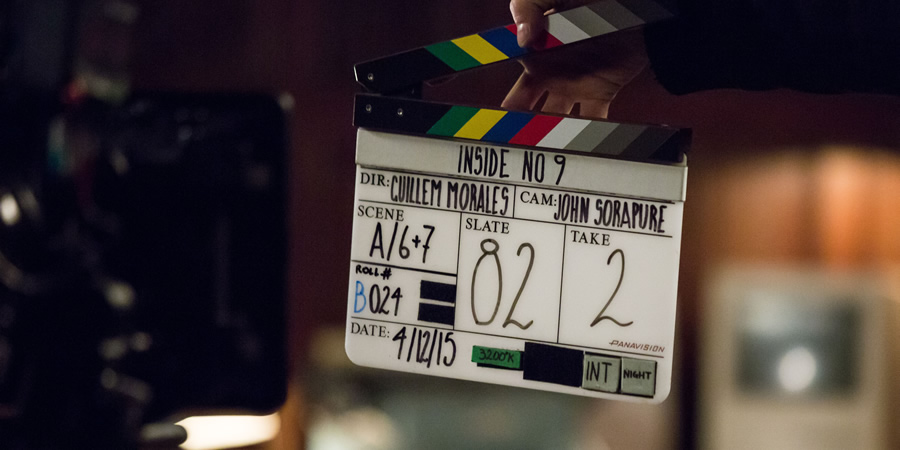
The duo have a unexpected surprise in store for the series they're filming next - a shifting tone. Reece reveals: "The fourth series, which is written and we start filming it in a few weeks, is much lighter." Steve adds: "That's the surprise of Series 4!"
One of the great things about the work of The League Of Gentlemen stars is they challenge themselves to play with presentation styles and fiddle with the modes via which they tell their stories. Fans will remember the filmed-in-one-take Psychoville special and the dialogue-free Inside No. 9 episode A Quiet Night In. Meanwhile Series 2 gave us the CCTV-camera based Cold Comfort and timeline bending 12 Days Of Christine. Most recently, they recorded The Devil Of Christmas using real 1970s equipment.
It turns out they've made innovation a 'rule'. "We try to find a tone, or way of shooting, that's different. There aren't that many different ways of doing it, but within a series definitely. I think you'd be hard pushed to point at any similarities between any two episodes."
They add a note of caution: "It has to be driven by the material really. We definitely like to experiment, but it has to be right for the episode. It would be wrong to impose something. We've done one in the new series - Series 4 - that is in reverse chronology, so that was quite interesting and quite a challenge. That's what you can do in an anthology, it's much harder to do it in a regular series. We can take you and do literally anything, so we enjoy setting ourselves that challenge!"
Reece admits: "It's quite hard to keep coming up with a way of presenting telly in a different way." However, not only is there the 'reverse' episode in Series 4, they're promising a script which has been written entirely in iambic pentameter! "We just thought 'what a stupid idea, let's do it!'"
Could there be a Series 5? They say of the show's format: "It's something that could keep going and going, but it's only the two of us writing it, and it's just whether we start repeating ourselves. If we do, then that is the time to get out."
They're not out of ideas yet though. Producer Adam Tandy is keen to film an episode in zero gravity one day. Asked about other ideas, such as an animated episode, they say they "wouldn't rule anything out", provided there's the budget to try it.
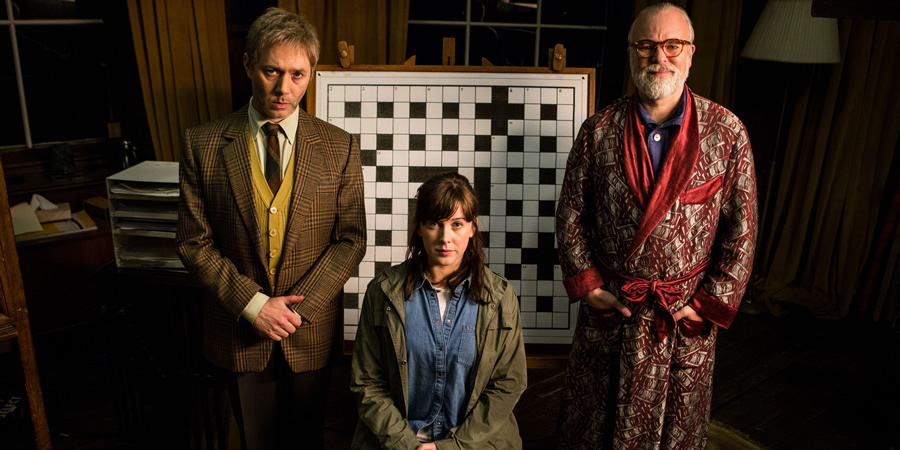
They promise some great actors for Series 4, and the same is true for the new episodes coming up in Series 3. The names on the cast lists for the next few episodes include Felicity Kendal, Mathew Baynton, Sarah Hadland and Alexandra Roach, to name but a few.
We wondered, when they're writing the scripts, do they have people in mind for the roles? Reece answers: "It is always after. We don't even write them thinking about ourselves in them! Mainly because we think that might slightly hamper the best storytelling that will be available to us.
"When we're finished writing we think 'oh, who is going to play that?'. It would be hard to put your eggs in one basket and hope for someone, and if you can't get them then you're forever feeling slightly disappointed."
Steve adds: "Sometimes the name will come to you in the middle, like Sheridan [Smith] was a good example of that. Oona Chaplin [Charlie Chaplin's granddaughter, who appeared in the silent episode] was director David Kerr's suggestion. But normally we just wait and see, and it's a great game to play getting the cast together. We've been very lucky so far."
What's it been like working with the guest cast in this series? Reece: "It's been great, it's always lovely to hear back that they enjoy the scripts and stories. They're appealing things to do for an actor, it's great to get a good script and think 'I've got an important role to play in it, even if it's just a little part'. We've had some great people in small roles who you think normally might not say yes. Being actors ourselves, we know what it's like to get asked to do something and you read it and you think 'can I bring something to it?' - and we always try to do that, even with the smallest parts. That's how we manage to trap some very good people into being part of our world."
Steve: "A lot of the people we work with are very busy, and I know in Keeley Hawes and Philip Glenister's cases they both said they were hoping they weren't going to like the script because they were so busy, but they had to do it because they loved it so much - and that's the trick we play in pulling people in. They're also unusual scripts and stories.
"Having a brand new cast of people coming in always re-energises us, because we're in every episode. When it's coming towards the end of the week the cast get jealous about who we've got coming in next. When we did Empty Orchestra, Tamzin Outhwaite and Sarah Hadland said, 'you're not going to enjoy the next one as much! We're gonna be the best one, we're gonna be your favourite cast.' And then we took pictures of ourselves with Fiona Shaw and Morgana Robinson, crying with laughter, and sent them to them and said: 'we're having much more fun!'"
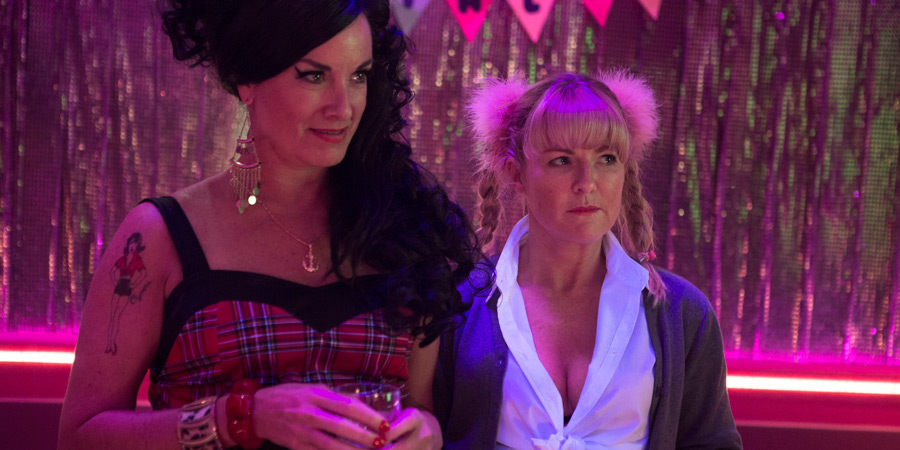
Being in Inside No. 9 is clearly a big draw for actors. Reece says: "We hear that, when casting is happening, some agents ring up and say 'so and so would be interested', which is nice. I think it is a treat for actors, it's a very appealing thing - a one off, a week's work and it's good quality I think. And when you get scripts it's nice to read a one-off that's an enjoyable tale."
Perhaps annoyingly for actors who have enjoyed their time on set, Reece and Steve have a rule of not inviting people back to work with them again in the future, to ensure their shows remain fresh. Reece expands: "We never have anyone back we've worked with before. Just to keep it so you can't go 'oh yeah, that person again'. It might give a familiarity that you want to avoid." However, Jason Watkins, who appears in The Bill, was also in Psychoville. They admit to breaking their rule for him. "Jason is a brilliant comic actor."
So with five stories to enjoy over the next five weeks, which should we be looking forward to the most? Producer Adam Tandy goes first: "My favourite is probably Diddle Diddle Dumpling, which is the one with Keeley Hawes in it, about a man who finds a shoe in the road outside and tries to get it back to its owner. It sounds like a trite simple idea but as a half hour decent into a man's obsession it is quite extraordinary."
Reece says his favourite of the new batch of episodes is The Riddle Of The Sphinx, whilst Steve picks Empty Orchestra describing it as "a real joy of an episode. I get to sing a bit of Rainbow. It's very different to everything else we've done up to that point, and I hope people will enjoy it." However, speaking about the series as a whole, he then echoes our thought: "But they're all a joy."
Whilst the finished cut of Empty Orchestra is one of their favourites, it turns out it was one of the hardest to film. Tandy, talking from a producer's point of view, explains: "Empty Orchestra was the script that came in at the end of the six scripts and technically it turned out to be the biggest challenge. Simultaneously people singing songs and trying to have conversations. To record it all 'clean' and have options in the edit, that was technically hard on everybody. Within the six scripts we'd sort of assumed it'd be an average cost and it was one of those things that didn't go wrong, but it was the one where we were the most tired at the end of it."
Steve explains: "It was intended to be a musical, and it is kind of a musical as there's music all the way through it. You know in karaoke scenes in things you see people sing the first two lines and then it cuts to something? We sing the entire time because we're never leaving that room. I'd love to do a proper musical though - a La La Land style musical - but I think for now Empty Orchestra ticks that box to some degree. And the idea of doing a love story was very appealing, and that's what that is."
In summary: The next five weeks are not to be missed!

